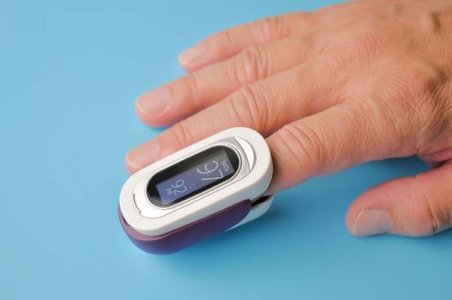This hidden flaw in pulse oximeters could affect your health — and your doctor might have no clue!
- Replies 0
As we navigate the complexities of modern healthcare, it's crucial to be aware of the tools and technologies that are supposed to keep us safe and healthy.
One such device, the pulse oximeter, has been a staple in medical settings for decades, offering a quick and non-invasive way to measure blood oxygen levels.
However, a concerning issue has come to light, one that could have significant implications for patient care, particularly for individuals with darker skin tones.
The pulse oximeter, a device that clips onto a patient's fingertip and uses light to estimate the level of oxygen in the blood, has been revealed to have a hidden flaw that could lead to misdiagnoses and inadequate treatment.
This flaw is not widely known, even among medical professionals, and it's something that everyone should be aware of, especially since it could directly impact your health or that of your loved ones.
The problem was brought into sharp focus by the experience of Tomisa Starr, a 61-year-old woman from Sacramento, California.
Despite suffering from multiple chronic health conditions and using an oxygen tank at home, Starr's request for supplemental oxygen in the hospital was denied.

The pulse oximeter readings falsely indicated that she was getting enough air, but Starr, who is Black, knew about research suggesting that these devices may not work as well on people with darker skin.
Starr's struggle to be heard by her healthcare providers is not an isolated incident. Dr. Hugh Cassiere, a critical care physician in New York, has been educating his peers about this issue, noting that the racial disparities built into pulse oximeters have been ignored for years.
The potential problems with these devices have been known for decades, but it wasn't until the COVID-19 pandemic that the real dangers became clear, prompting the Food and Drug Administration (FDA) to issue warnings and draft new guidance for manufacturers.
The FDA's draft guidance, issued last week, calls for manufacturers to test their devices on a wider range of skin tones to ensure accuracy for all patients. Historically, studies of pulse oximeters have not included a significant number of dark-skinned individuals, leading to a lack of consistent and valid measurement standards.
The gold standard for measuring blood oxygen levels is an arterial blood draw, which, while invasive and painful, provides crucial information about a patient's lung function.
Pulse oximeters were introduced as a painless alternative, but the light they use is also absorbed by melanin in the skin, which can lead to inaccurately high readings for people with darker skin tones.
This issue was first identified in a study 34 years ago but was largely disregarded until recently.
The pandemic highlighted the discrepancies in pulse oximeter readings, with research showing that Black and brown patients were more likely to receive false normal results, potentially affecting their treatment and outcomes.
The implications of these faulty readings extend beyond COVID-19 treatment. They could also impact the eligibility of Black patients for advanced therapies, such as heart pumps or transplants.
With ongoing research attempting to identify which devices work equally well across different skin pigments, it's clear that more work needs to be done to ensure equitable healthcare for all.
Source: NBC News / Youtube.
If you or a loved one relies on a pulse oximeter, particularly if you have a darker skin tone, it's important to be aware of this potential inaccuracy.
Discuss any concerns with your healthcare provider and consider seeking a second opinion or additional testing if you feel your oxygen levels are not being accurately assessed.

What do you think of this issue with pulse oximeters? Have you or someone you know experienced issues with pulse oximeter readings? Share your thoughts and stories in the comments below!
One such device, the pulse oximeter, has been a staple in medical settings for decades, offering a quick and non-invasive way to measure blood oxygen levels.
However, a concerning issue has come to light, one that could have significant implications for patient care, particularly for individuals with darker skin tones.
The pulse oximeter, a device that clips onto a patient's fingertip and uses light to estimate the level of oxygen in the blood, has been revealed to have a hidden flaw that could lead to misdiagnoses and inadequate treatment.
This flaw is not widely known, even among medical professionals, and it's something that everyone should be aware of, especially since it could directly impact your health or that of your loved ones.
The problem was brought into sharp focus by the experience of Tomisa Starr, a 61-year-old woman from Sacramento, California.
Despite suffering from multiple chronic health conditions and using an oxygen tank at home, Starr's request for supplemental oxygen in the hospital was denied.

Pulse oximeters, devices that measure blood oxygen levels, have been found to give less accurate readings for people with darker skin, potentially affecting patient treatment. Image source: subarasikaiai / Pixabay.
The pulse oximeter readings falsely indicated that she was getting enough air, but Starr, who is Black, knew about research suggesting that these devices may not work as well on people with darker skin.
Starr's struggle to be heard by her healthcare providers is not an isolated incident. Dr. Hugh Cassiere, a critical care physician in New York, has been educating his peers about this issue, noting that the racial disparities built into pulse oximeters have been ignored for years.
The potential problems with these devices have been known for decades, but it wasn't until the COVID-19 pandemic that the real dangers became clear, prompting the Food and Drug Administration (FDA) to issue warnings and draft new guidance for manufacturers.
The FDA's draft guidance, issued last week, calls for manufacturers to test their devices on a wider range of skin tones to ensure accuracy for all patients. Historically, studies of pulse oximeters have not included a significant number of dark-skinned individuals, leading to a lack of consistent and valid measurement standards.
The gold standard for measuring blood oxygen levels is an arterial blood draw, which, while invasive and painful, provides crucial information about a patient's lung function.
Pulse oximeters were introduced as a painless alternative, but the light they use is also absorbed by melanin in the skin, which can lead to inaccurately high readings for people with darker skin tones.
This issue was first identified in a study 34 years ago but was largely disregarded until recently.
The pandemic highlighted the discrepancies in pulse oximeter readings, with research showing that Black and brown patients were more likely to receive false normal results, potentially affecting their treatment and outcomes.
The implications of these faulty readings extend beyond COVID-19 treatment. They could also impact the eligibility of Black patients for advanced therapies, such as heart pumps or transplants.
With ongoing research attempting to identify which devices work equally well across different skin pigments, it's clear that more work needs to be done to ensure equitable healthcare for all.
Source: NBC News / Youtube.
If you or a loved one relies on a pulse oximeter, particularly if you have a darker skin tone, it's important to be aware of this potential inaccuracy.
Discuss any concerns with your healthcare provider and consider seeking a second opinion or additional testing if you feel your oxygen levels are not being accurately assessed.
Key Takeaways
- Pulse oximeters, devices that measure blood oxygen levels, have been found to give less accurate readings for people with darker skin, potentially affecting patient treatment.
- Historical exclusion of dark-skinned individuals in pulse oximeter studies has led to racial disparities in healthcare outcomes, with the FDA only recently issuing draft guidance to address skin tone bias in device testing.
- Research has shown that faulty pulse oximeter readings may limit access to advanced therapies for patients with conditions like heart failure, disproportionately affecting Black patients.
- Some companies have started to add warning labels about potential skin tone biases on pulse oximeters following lawsuits, mainly in California, but broader action and understanding of the issue remain necessary.
What do you think of this issue with pulse oximeters? Have you or someone you know experienced issues with pulse oximeter readings? Share your thoughts and stories in the comments below!






